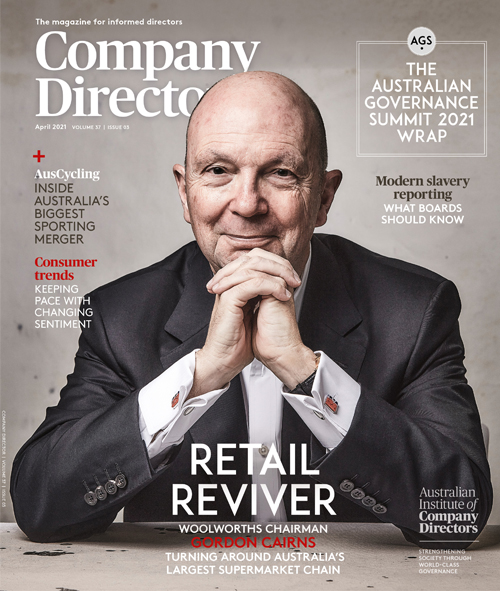Leading directors and experts explain why a culture of innovation can fast-track an organisation's competitiveness, success, market share and growth.
Innovation shouldn’t be considered in isolation and as a means unto itself, but instead should be put in the context of an organisation’s competitive position and customers, the 2021 AGS panel Accelerating innovation: How boards can shape the future heard.
“We’re looking at innovation and tech almost as standalone things — and not looking at them in terms of how we compete in the market,” said Andrew Stevens, chair of Industry Innovation and Science Australia, the primary advisory body to the government on industry and innovation policy. “Innovation is the means — the end is competitiveness, success, market share and growth.”
Margie Seale FAICD, a director of Scentre Group, Westpac and Telstra, told the panel session that “Innovation is a whole-of-business game”. Directors need to look beyond their own company and ask themselves what is happening in the ecosystem in which they operate, how their customers perceive them and what the company can provide to them — not just now, but in five or 10 years. Seale said that unless the board and management team really want to think about their customers and delivering great products now and in the future, then innovation won’t happen. “If you don’t innovate, then innovation will happen around you and to you,” she said. “That requires a very hungry and pushy chair.”
Emma Gray, ANZ group executive, data and automation, picked up on the point, noting it is important for boards to understand what’s happening to their customers, where the money is flowing in their industry, and to what extent their value chain is being disrupted. “If we don’t understand these things on an ongoing basis then we just miss way too much,” she said.
Thinking about these questions leads to another set of questions, said Gray. “Does the board and management have a shared understanding of both the basis of competition and also our right to compete? Are we actually good at anything when we think about those trends?” She said boards should plot all things they do on a matrix and ask which of those somebody would buy from them. People might pay significant sums for capabilities — “if you dusted them off and put a new brand on them” — because they are growth attributes and capabilities. There are also a lot of “dogs”, which have been starved of growth or investment or “cash cows”.
The next question for a board is: what kind of innovation is required? Different parts of the business will require different muscles — some will need automation, while some might need significant R&D spend to develop new markets. One key question for boards to ask is: how good is the organisation’s data?
Gray stressed that even though it sounds obvious, having a single customer view across channels can solve a lot of problems. “It’s a really boring question, but it’s the difference between things being correct and not being correct,” she said, adding that if management can’t answer some of the fundamental questions about the quality and governance of its data, then its efforts in AI and automation could be wasted.
Stevens, also a director of Stockland Group and oOh! Media, cited a survey by Industry Innovation and Science Australia showing that only six per cent of Australian businesses say they invest in research and development; and just 30 per cent say they invest in non-R&D innovation. “If less than a third of our businesses are working on their competitiveness, we have an issue for the prosperity of the nation and we’ve got an issue in terms of jobs and futures for generations to come,” he said, adding that all boards have a role to play in keeping this front and centre.
Latest news
Already a member?
Login to view this content



